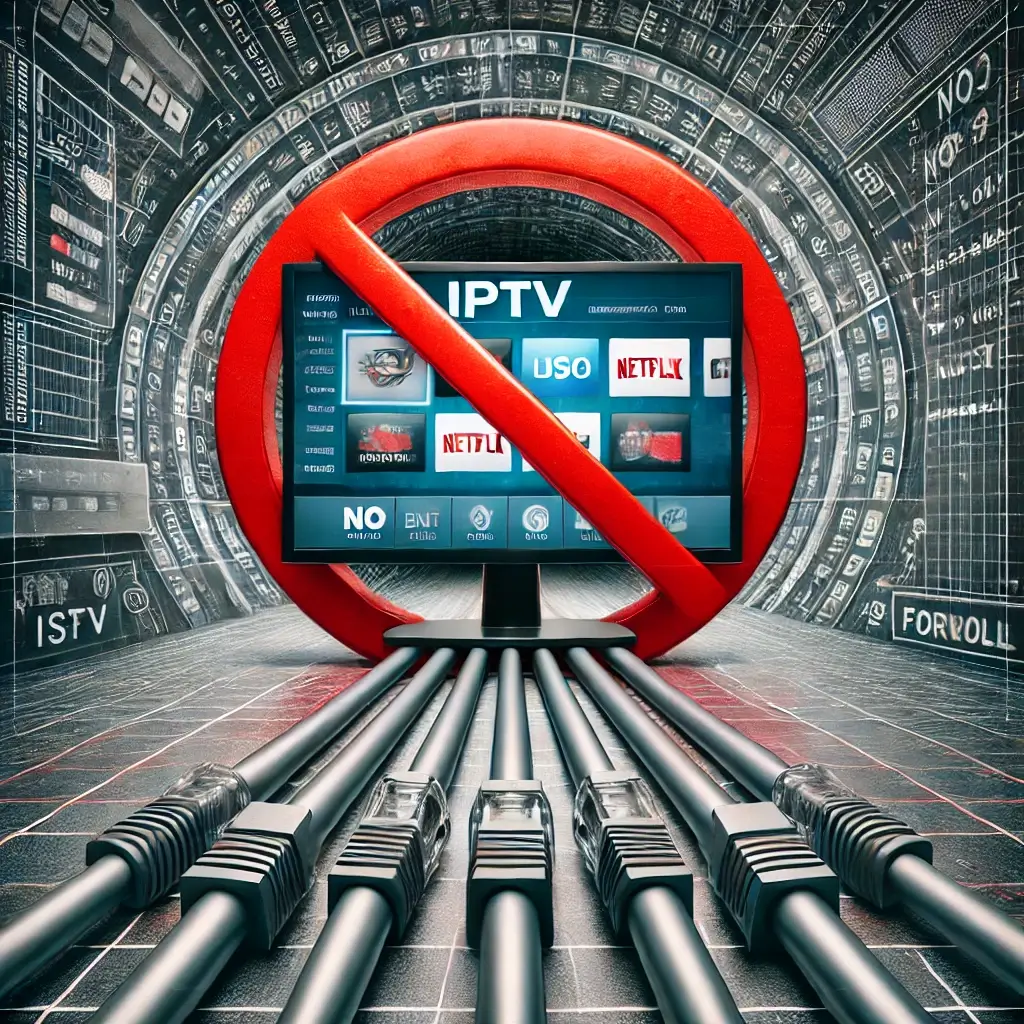
Can IPTV Be Blocked By Internet Providers?
Can IPTV Be Blocked By Internet Providers? In recent years, Internet Protocol Television (IPTV) has surged in popularity as an alternative to traditional cable and satellite TV. However, as more viewers adopt this streaming option, questions arise about whether Internet Service Providers (ISPs) can block access to these services. Gaining insight into this issue can help users make more informed decisions about their viewing options.
A key concern is whether ISPs have the power to restrict access to CatchOnTV IPTV services. The short answer is yes—ISPs can potentially block or slow down IPTV traffic. Several factors contribute to this:
-
- Content Licensing: Many IPTV services stream unlicensed content, prompting content owners and licensors to pressure ISPs to block these services.
-
- Network Management: ISPs often use traffic management practices. If CatchOn TV IPTV services use large amounts of bandwidth, ISPs may throttle or block the traffic to maintain network performance for other users.
-
- Legal Compliance: In some countries, ISPs are legally required to block access to IPTV channels that are deemed illegal.
Despite their ability to restrict ottocean IPTV, it’s important to understand how ISPs typically enforce these measures. They often use one of the following methods:
-
- DNS Filtering: ISPs can interfere with Domain Name System (DNS) requests, making it difficult to reach certain MOM IPTV websites.
-
- IP Address Blocking: By blocking the IP addresses associated with ottocean IPTV services, ISPs can prevent users from accessing these platforms.
-
- Protocol Blocking: Using deep packet inspection, ISPs can identify and block specific data packets used in OTTOCEAN IPTV streaming.
Not all ISPs aggressively pursue these tactics, as many prioritize optimizing their networks rather than blocking services. However, in some regions, popular OTTOCEAN IPTV services have been throttled or blocked due to legal and licensing issues.
Users can find ways to circumvent these restrictions. For example, many people use Virtual Private Networks (VPNs) to mask their internet traffic. A VPN encrypts data and changes the user’s virtual location, making it harder for ISPs to track and manage IPTV traffic. However, VPN use may lead to slower speeds and can carry legal risks depending on the country.
As IPTV use continues to grow, users should be aware of potential risks associated with unverified IPTV providers:
-
- Quality of Service: Not all IPTV internet providers services deliver the high-definition content they promise.
-
- Privacy Concerns: Some IPTV internet providers may not prioritize user privacy, increasing the risk of data breaches or unauthorized access to personal information.
-
- Legality: Depending on your location, accessing certain IPTV internet providers services may violate copyright laws, leading to legal consequences.
Consumers need to stay informed about their options. While ISPs can block MOM IPTV services, the extent of these actions varies by provider and region. As MOM IPTV grows in popularity, ongoing discussions around legality, user rights, and ISP practices will shape the future of media consumption.
The Impact of ISP Throttling on Streaming Services
The relationship between Internet Service Providers (ISPs) and streaming services has become a critical factor in shaping today’s entertainment landscape, as more and more people turn to online platforms for their television shows, movies, and live broadcasts. One key issue that has emerged for consumers in this digital age is ISP throttling—when internet providers intentionally slow down connection speeds for certain types of data, including streaming content. This practice can significantly impact the quality of the viewing experience, resulting in buffering, lower resolution, or lag during live broadcasts, internet provider near me.
Understanding how ISP throttling works and the effects it can have on streaming services is essential for consumers looking to make informed choices about their entertainment options. Throttling can occur when ISPs detect high bandwidth usage, particularly during peak hours, or in cases where they have agreements with certain platforms, prioritizing some content over others, internet providers near me.
For viewers, this means that even with a high-speed internet plan, their favorite streaming services might not perform at optimal levels if throttling is in place. By educating themselves about the signs of throttling and the ways to address it—such as using VPNs, switching ISPs, or selecting services with better partnerships—users can better navigate their streaming experience and enjoy smoother, high-quality content without unnecessary interruptions. This understanding is crucial for maintaining control over one’s viewing experience in an increasingly complex digital ecosystem, internet providers in my area.
A free trial is a great way to test out a service before committing. It allows you to evaluate the picture quality, content selection, user experience, and device compatibility. Many high-quality IPTV services, including KEMO IPTV, offer free trials. With KEMO IPTV, you can access over 1300 channels and 3000 shows for free during the trial period.
Signing up for a free trial is simple. Choose the service you’re interested in, provide your information, and you’ll receive an activation code to start watching right away. It’s a quick and easy process, and you’ll be able to decide if it’s the right fit for you.
It’s smart to research and compare different IPTV internet providers before making a decision. Check out online reviews, social media, and feedback from other users. Make sure to take advantage of free trials so you can get the best IPTV experience with amazing shows and worry-free streaming.
Finding the right IPTV internet providers service can seem overwhelming, but I’ve already done the legwork for you. When choosing a service, consider the variety of content, picture quality, pricing, device compatibility, ease of use, reliability, customer support, and any extra features that might be important to you. By looking at these factors, you’ll be able to pick the IPTV service that’s right for you and enjoy hassle-free viewing.
is becoming increasingly popular in Europe, signaling a shift toward online TV. Europe has over 13 different IPTV providers, catering to all types of viewers—whether you’re into sports or movies, you’ll find something for you. KEMO IPTV internet provider is one of the top choices, offering a wide range of content that you can watch on multiple devices, often at a reasonable price. You can even tailor your subscription to fit your budget and preferences.

When searching for internet providers, many people are often overwhelmed by the variety of options available. The rapid advancement of technology has led to a proliferation of internet service providers (ISPs), each offering different plans, speeds, and services. Understanding these options is crucial for finding the right fit for your needs, whether for work, streaming, gaming, or browsing.
Choosing the right internet provider can greatly impact your online experience. Factors such as connection speed, reliability, customer service, and pricing all play a vital role in making an informed decision. It’s essential to assess your usage habits to determine what type of service you require—whether that’s basic internet for casual browsing or high-speed fiber-optic connections for intensive streaming and gaming.
One of the first steps in finding the best internet provider near me is to research the options available in your local area. This search can yield a range of results, from major national providers to smaller, regional companies that may offer competitive pricing or unique packages. Utilizing online tools or websites that compare ISPs can simplify this process, making it easier to find the best options tailored to your needs.
When exploring internet providers in my area, it’s important to consider the types of connections they offer. Common types include DSL, cable, fiber-optic, and satellite. Fiber-optic connections are known for their speed and reliability, making them a popular choice for households with heavy internet usage. In contrast, DSL and cable may be more widely available, though they can vary significantly in performance.
Availability is another key factor when searching for internet providers near me. Some areas may have access to multiple ISPs, while others may be limited to just one or two. This can greatly affect not only pricing but also the quality of service you can expect. Checking with local providers directly or using online availability checkers can help clarify your options.
Pricing structures vary widely among internet providers. Some may offer promotional rates for the first year, while others may have flat-rate pricing that remains consistent. It’s essential to read the fine print and understand any additional fees, such as installation costs or equipment rentals. Comparing these factors can help ensure that you choose a provider that offers the best overall value.
Customer service is another critical aspect to consider when selecting an internet provider. A company with responsive support can make a significant difference, especially when technical issues arise. Reading customer reviews and ratings can provide insight into the quality of service offered by various ISPs, helping you gauge their reputation for support and reliability.
As you explore internet providers in my area, consider any bundled packages they may offer. Many providers now offer combined services, including internet, television, and phone, which can often lead to savings. These bundles can simplify billing and provide more comprehensive services for households that need multiple forms of entertainment and communication.
With the rise of remote work and online learning, the demand for reliable internet has never been higher. When searching for internet providers near me, it’s crucial to prioritize speed and reliability. Look for providers that can meet or exceed the minimum speed requirements for video conferencing and streaming to ensure a smooth online experience.
For those living in rural or underserved areas, finding internet providers can be particularly challenging. However, some companies are dedicated to expanding their services to reach these communities. Exploring options like fixed wireless or satellite internet can provide alternatives where traditional cable or fiber-optic services may not be available.
As competition among internet providers increases, many are focusing on improving their services and offerings. This can lead to better pricing, faster speeds, and enhanced customer service. Staying informed about new developments in your area, such as the rollout of new technologies, can help you take advantage of improved services as they become available.
Another aspect to consider is the contract terms associated with your chosen internet provider. Some companies may require long-term contracts, while others offer month-to-month plans for more flexibility. Understanding these terms can help you avoid potential pitfalls, especially if your internet needs change in the future.
In addition to traditional ISPs, there are also community-based internet providers that focus on delivering high-quality service to specific areas. These providers often prioritize local customer needs and can offer personalized service and support. Researching these options can uncover hidden gems that may provide excellent value and support.
Ultimately, the goal of finding the best internet providers is to ensure that you have reliable and fast access to the online world. By thoroughly researching your options, comparing pricing and services, and considering customer feedback, you can make an informed decision that meets your needs.
In conclusion, navigating the landscape of internet providers requires careful consideration and research. From assessing the types of connections available to understanding pricing structures and customer service, there are many factors to keep in mind. By taking the time to explore your options, you can find an internet provider near me that delivers the quality and reliability you deserve.
When searching for internet providers, it’s also crucial to consider the type of technology used in your area. Different ISPs utilize varying technologies, which can affect speed and reliability. For example, fiber-optic connections are generally faster and more stable than DSL or cable, making them ideal for households with multiple users or high-bandwidth needs. Understanding the infrastructure available in your location can help you make an informed choice.
Another important consideration is data caps. Some internet providers impose limits on the amount of data you can use each month. Exceeding these caps can result in additional fees or throttled speeds. When comparing internet providers near me, make sure to inquire about any data restrictions and choose a plan that accommodates your typical usage, especially if you stream videos or play online games frequently.
In today’s digital age, security features are more important than ever. When evaluating internet providers in my area, it’s wise to consider the security measures they offer. Look for providers that include robust firewall protections, secure Wi-Fi settings, and options for antivirus software. A strong security package can safeguard your online activities, particularly when using shared networks.
Customer satisfaction is another crucial aspect to assess when researching internet providers near me. Third-party review sites can provide valuable insights into customer experiences regarding reliability, support, and overall satisfaction. Pay attention to recurring themes in reviews, such as complaints about downtime or praise for responsive customer service, as these can guide you toward a better provider.
For many users, installation processes can be a significant consideration. Some internet providers offer self-installation kits, while others require a technician visit. If convenience is important to you, it may be worth seeking providers that facilitate a straightforward installation process. Moreover, inquire about any installation fees that might be associated with setting up your service.
Promotional offers can also play a significant role in your decision-making process. Many internet providers run special promotions that include discounted rates for the first few months of service. While these deals can provide initial savings, it’s essential to understand how pricing changes after the promotional period ends. Ensure that you’re comfortable with the regular rates before committing to a long-term contract.
As part of your search for the best internet provider, it can be beneficial to explore local options. Smaller, regional providers often focus on specific communities and can offer competitive rates and personalized service that larger corporations might overlook. These local ISPs may have a better understanding of your area’s unique needs and can provide tailored solutions.
In addition to standard internet services, many providers offer additional features that can enhance your experience. For instance, some ISPs include free access to Wi-Fi hotspots, email accounts, or cloud storage solutions. Evaluating these additional offerings can help you find a provider that not only meets your internet needs but also adds value with extra features.
When looking for internet providers in my area, be sure to check if the provider offers flexibility in upgrading your plan. As usage demands grow, you may need to increase your bandwidth or switch to a higher-speed package. Having a provider that allows for easy upgrades can save you the hassle of switching services later on.
Lastly, consider the long-term reputation of the internet provider you choose. Established providers may have more resources for infrastructure and customer support, while newer companies might offer innovative solutions at competitive prices. Researching the history and reputation of your potential ISPs can help you make a choice that balances reliability with value.
In conclusion, navigating the world of internet providers involves a comprehensive approach. By considering factors like technology, data caps, security, customer satisfaction, installation processes, promotional offers, local options, additional features, plan flexibility, and the provider’s reputation, you can make an informed choice that suits your needs. Taking the time to thoroughly research your options will ultimately lead to a more satisfying internet experience.





